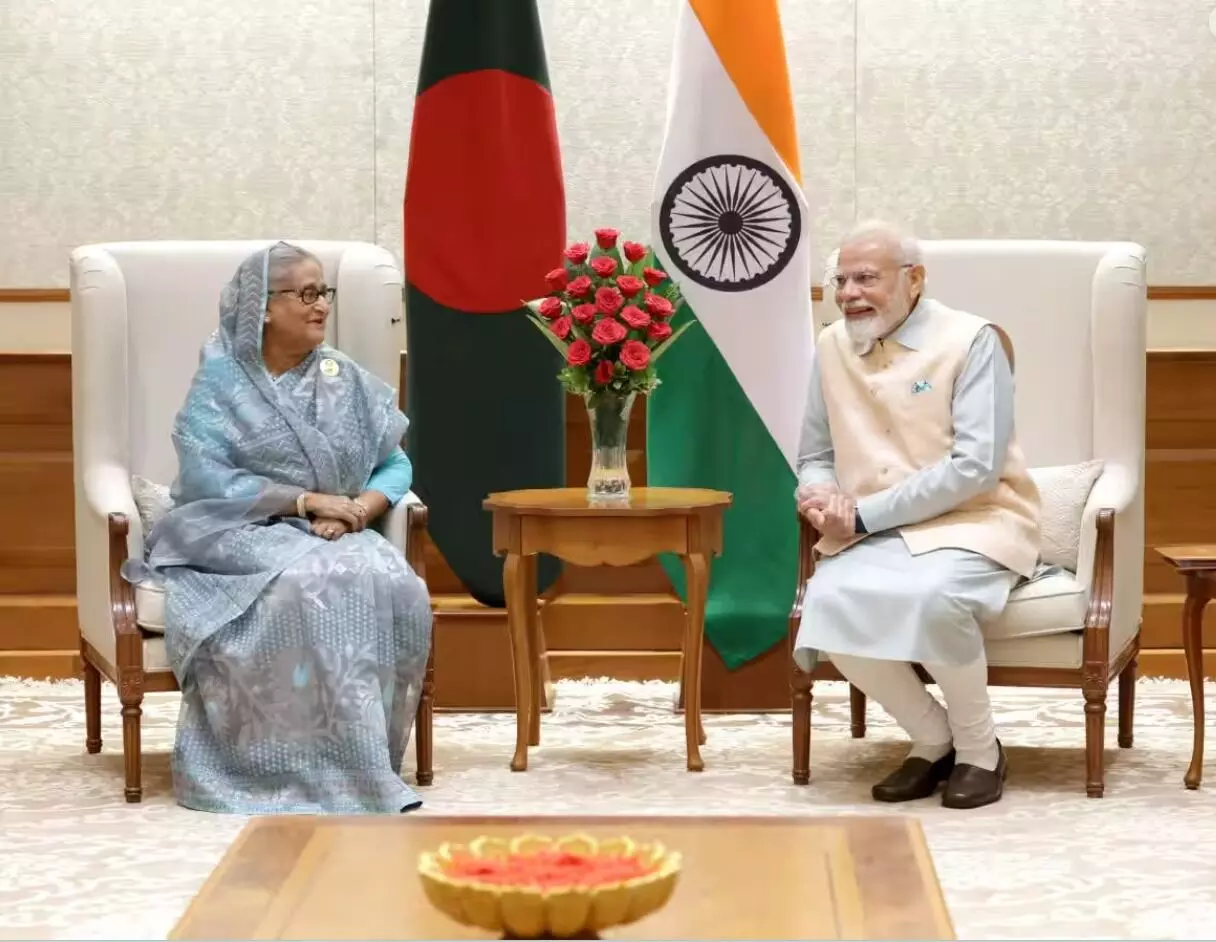Indo-B'desh bonhomie
B'desh PM Sheikh Hasina's upcoming visit highlights the growing ties with India, resulting in key agreements on connectivity, trade, and cooperation, while addressing challenges and strengthening bilateral relations

Bangladesh Prime Minister Sheikh Hasina’s second visit to India in less than a fortnight (earlier, she was present at the swearing-in ceremony of Prime Minister Narendra Modi on June 9) signals the growing of strong ties between the two neighbours. Hasina has been extraordinarily dexterous in displaying her statesmanship about ties with India proving time and again that she is the staunchest ally of India in the South Asian region and perhaps in the whole world.
During her visit, she called on the President and Vice President and many other dignitaries reaffirming her partnership in India touching upon a plethora of issues. Both countries also signed several agreements. They included maritime cooperation and economy, rail connectivity, oceanography, health and disaster management and many more. Elaborating on the Memorandum of Understanding (MoU) on railway connectivity (June 22). Foreign Secretary Vinay Mohan Kwatra said that apart from the six existing cross-border railway links between the countries, the MoU focuses on transit that they afford between different parts of India through the territory of Bangladesh. This looks functionally tangible besides providing huge convenience to rail travelers.
The connectivity essentially strengthens a very large part of the economic infrastructure within Bangladesh. Crucially, it’s effectively a connectivity paradigm that benefits both the countries, both the societies, and both the economies, very extensively. This Sub-regional transit that Bangladesh would get to Bhutan and Nepal would now have scope for further expansion and development. It is further gathered that India will attempt to run a train service in the near future connecting the northeastern States such as Tripura and West Bengal through Bangladesh.
Welcoming the leader of Bangladesh, Indian Prime Minister Narendra Modi disclosed the opening of an office of Assistant High Commission in Rangpur in the northern part of Bangladesh. This is a very significant development. Rangpur, which is strategically located between West Bengal and Assam, is also important as it is nurtured by the waters of the Teesta, which is a matter of protracted negotiation between India and Bangladesh. This move is expected to give immense satisfaction to the people residing in and around Rangpur for seeking visas to visit India to meet relatives and also avail medical facilities.
During an event at the Hyderabad House, the Indian Prime Minister announced that a technical team from India would shortly visit Bangladesh to discuss the conservation and management of the Teesta River. Against the backdrop of stalled negotiations on the sharing of the waters of the Teesta, Bangladesh came up with the project to conserve Teesta and subsequently, the project triggered off.
Significantly, the Indian Prime Minister also stated that India will start issuing e-medical visas to deal with the growing demand for medical visas from Bangladesh. The two sides also signed an MoU on launching small satellites. Ms Hasina on her part, said she discussed politics, security, trade, connectivity, sharing of water from common rivers, energy, regional and multilateral cooperation while describing her visit as “incomparable” as this is her second visit to India within a span of a fortnight.
Meanwhile, in Dhaka, Hasina’s main political adversary, the Bangladesh Nationalist Party (BNP) leadership has protested against the agreements. The party secretary General Mirza Fakhrul Islam Alamgir reacted by saying their party will announce a protest program against the recent deals and MoUs signed with India during the Prime Minister’s visit, as they allege these agreements are “anti-state”. Speaking at a press conference, he charged that Sheikh Hasina's recent visit to India resulted in the signing of 10 agreements, comprising two treaties, five new MoUs, and three renewed agreements, apprehending they could “jeopardize” the country's sovereignty and independence as they are “detrimental” to Bangladesh’s interests. BNP was also expected to hold a press conference on June 28 on this issue and announce further their protest programmes.
Very importantly, Prime Minister Sheikh Hasina, bold as ever, strongly defended her India visit and supported all the agreements signed. At a press conference when questions were raised if India could be depended upon or whether India was a genuine friend, she used very strong words in support of her visit and the agreements as well. She went to the extent of acknowledging the friendship and supreme sacrifice India made at the time of the Liberation struggle, singularly standing by the side of Bangladesh in an extraordinary show of solidarity. She also said no country then stood by the Bangladesh side other than India. Her statements have not only silenced her critics but have also further concretized Indo-BD bonhomie on a more firm footing. The tenor of her unambiguous and clear remarks in support of her recent Indian visit leaves not an iota of doubt about her commitment towards India. This message is loud and clear which is also likely to resonate in China where she is expected to visit soon.
The writer is a retired IPS officer, Adviser NatStrat, and a former National Security Advisor in Mauritius. Views expressed are personal



